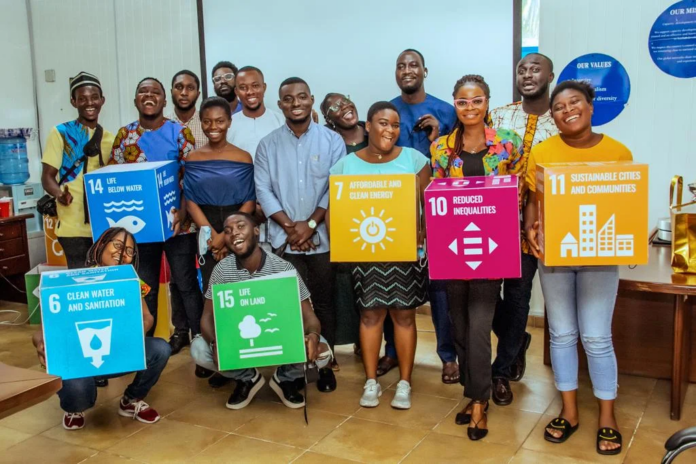A recent study by Odoom, et al., (2024) titled “Examining the Level of Public Awareness on the Sustainable Development Goals in Africa: An empirical evidence from Ghana” published in Environment, Development and Sustainability by Springer examines that the communication strategies used to raise SDG awareness were generally ineffective, with stakeholder engagement, radio, and TV programs being moderately effective, while community dialogue and social media were not.
“
Ghana’s awareness of the Sustainable Development Goals is uneven, with low recognition of certain goals, necessitating improved communication and engagement strategies.– Odoom, et al., (2024)
The article “Examining the level of public awareness on the Sustainable Development Goals in Africa: An Empirical Evidence from Ghana,” investigates the awareness of Ghanaians regarding the United Nations’ Sustainable Development Goals (SDGs). The research assesses the awareness among Ghanaians about various SDGs, finding high awareness for goals related to poverty, hunger, health, gender equality, and clean water, but very low awareness for goals related to industry, life below water, and peace and justice. The study evaluates the effectiveness of communication strategies in raising SDG awareness and suggests that the government should re-examine its approach to involve grassroots populations more effectively. It reveals no significant difference in awareness between male and female respondents but shows that educational levels impact the overall awareness of the SDGs.
How the Study was Conducted
The authors employed a descriptive survey design within a quantitative research approach. The authors utilized convenience sampling to select 431 respondents. Data was collected through a questionnaire administered in two ways: as a Google Form distributed via social media and as a self-administered questionnaire by the research team. The data collection occurred over two months, from August to October 2021, and was analyzed using Means, standard deviation, Mann–Whitney U test, Kruskal Wallis, and Pearson Product-Moment Correlations. The study also ensured ethical considerations such as confidentiality, anonymity, and voluntary participation.
What the Authors Found
The authors of the study found high awareness among Ghanaians about SDGs related to poverty, hunger, health, gender equality, and clean water. However, awareness of SDGs concerning industry, life below water, and peace was very low. The authors also found that there is no significant difference in awareness levels between male and female Ghanaians. In addition, the authors found that the communication strategies used to raise SDG awareness were generally ineffective, with stakeholder engagement, radio, and TV programs being moderately effective, while community dialogue and social media were not.
Why is this Important
Policy Implications: The low awareness of certain SDGs highlights the need for targeted communication strategies. Policymakers can use this information to design more effective awareness campaigns and engage grassroots populations.
Equity and Inclusivity: By understanding which goals have low awareness, efforts can be directed toward ensuring that all SDGs receive equal attention. This promotes inclusivity and ensures that no goal is left behind.
Sustainable Development: The SDGs are critical for global development. Raising awareness about them is essential for achieving sustainable development, poverty reduction, and environmental protection. Without awareness, progress toward these goals may be hindered.
Education and Advocacy: The study emphasizes the role of education in increasing awareness. Policymakers, educators, and civil society organizations can collaborate to educate citizens about the SDGs and encourage advocacy.
Global Cooperation: The SDGs are a global agenda. When citizens are aware of them, they can actively participate in advocating for their implementation, fostering global cooperation.
What the Authors Recommend
- Given the low awareness of certain SDGs, the authors recommend developing targeted communication strategies. These strategies should focus on raising awareness for specific goals that currently lack public attention. For example, industry-related goals, life below water, and peace-related goals could benefit from tailored communication efforts.
- The authors advocate that policymakers and organizations should actively engage grassroots populations. Community dialogues, workshops, and educational programs can help disseminate information about the SDGs. By involving local communities, awareness can be increased more effectively.
- While radio and TV programs were moderately effective, social media and community dialogue were less so. The authors suggest exploring innovative ways to use social media platforms and community engagement to improve awareness. Collaborating with media outlets can also enhance communication efforts.
- Educational institutions play a crucial role in raising awareness. The authors recommend integrating SDGs into school curricula. Educators can incorporate SDG-related content into lessons, promoting understanding and advocacy among students.
- In addition, the authors emphasize that the government should allocate resources to SDG awareness campaigns. Public service announcements, billboards, and community events can be effective tools. Additionally, policymakers should collaborate with civil society organizations and private sector entities to amplify awareness efforts.
- Regular monitoring and evaluation of awareness levels are essential. Policymakers should assess the impact of communication strategies and adjust them as needed. Data-driven decision-making will lead to more effective awareness campaigns.
The study conducted by Odoom, et al., sheds light on the varying levels of awareness about the Sustainable Development Goals in Ghana and identifies critical gaps in communication strategies. With high awareness of goals relating to poverty, hunger, and health, but lower recognition of industry, life below water, and peace, the findings underscore the need for a strategic overhaul to ensure all SDGs are equally prioritized. The recommendations to engage grassroots populations, enhance community dialogue, and leverage educational institutions highlight practical pathways to boost public understanding and advocacy. These insights not only guide policymakers in Ghana but also serve as a blueprint for similar efforts across Africa and beyond. Ultimately, the success of the SDGs depends on informed and engaged citizens who are committed to driving sustainable development forward.
















 The African Research (AR) Index is a comprehensive scholarly directory and database focused explicitly on journal publishers that publish and disseminate African research.
The African Research (AR) Index is a comprehensive scholarly directory and database focused explicitly on journal publishers that publish and disseminate African research.

